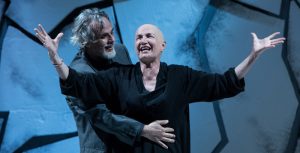
What Was I Thinking?
As I was meandering through Europe, contemplating exile, I found myself in Siracusa, Italy, taking it slow and relaxing in a nice hotel as I recuperated from back and leg pain (long story).
Once I was feeling better I ventured out to explore Ortigia, Siracusa’s “old town,” a charming tangle of picturesque narrow streets and even narrower alleyways that cries out to foreign tourists, “Inundate me!”
While wandering, about I happened upon the wonderfully named Teatro Massimo. A poster informed me that I was in luck. A show was on during my visit!
So it was that I booked a ticket for Un sogno a Istanbul (A Dream in Istanbul) for a quite reasonable 30 euros in the third row. My cursory glance led me to believe it was a dance piece, but no.
Un sogno a Istanbul is a new play by Alberto Bassetti, with original music by Mario Incudine, based on the novel “La Cotogna di Istanbul “(The Istanbul Quince) by Paolo Rumiz, a prominent Italian writer of whom I, like most self-respecting Americans, am completely ignorant.
It’s in Italian, of course, and my knowledge of the language doesn’t extend much beyond ciao! and a handful of menu terms, so what follows cannot be considered a review, which is why this post has been relegated to the ghetto of “the Blog.”
I decided to set myself the challenge of seeing what I could glean from the performance without understanding much of what was being said. Somewhat to my surprise I found myself paying close attention. I will confess however that my patience flagged toward the end when, based on the semiotics of the staged action, I started retitling the play “Four Characters in Search of a Curtain Line.”
If I am translating the program notes accurately, Un sogno a Istanbul tells the story of the love affair of Max (Maximillian Nisi), an Austrian technocrat sent to Sarajevo in 1997 during the unpleasantness of the Balkan wars for something or other. There a friend (Adriano Giraldi) fatefully introduces him Masha (or Maša).
Masha is described in the program as being long of leg with a Tartar’s eye, austere and wild, splendid and inaccessible. As portrayed by the formidable Maddalena Crippa she would have sent me hightailing it in the opposite direction. But Max is smitten. She seems to return the favor.
But fate, or duty, or something takes Max back to Vienna where he pines for news of his inamorata. When it comes, the news is not great. Masha is suffering from cancer and when he returns to Sarajevo she is completely bald from the effects of her treatment. This time love conquers all, but (spoiler alert) there is no happily ever after.
There is a fourth character, whose identity was not entirely clear to me. But he punctuates the action with song and music. He is portrayed by the multi-instrumentalist Mario Incudine who wrote the music. Both he and Crippa sing beautifully, which was a major plus for a non-Italian speaker like myself.
That summary may seem dismissive, but there is obviously more at stake here than the bare bones of the plot. Un sogno a Istanbul seems to have some important things to say about Europe and the path it is on. Alas, that was all opaque to me.
I’m glad I took this in because it brought home to me the challenges of the left-wing wacko liberals I know who are contemplating exile in the wake of the Tangerine Reich. If you are a theatre lover, unless you land in an anglophone country, you will be making a major cultural sacrifice, unless and until you master (and I do mean master) a new language.
I found the acting style, what you might call heightened realism, florid and almost operatic, which is not to say that it was poorly executed or “bad.” These were accomplished professionals and all performances were consistent throughout under the direction of Alessio Pizzech.
I found the mis en scene a bit puzzling. Great swaths of the action took place on a slanted white expanse with Max and Masha sitting on the ground. Metaphor? Or maybe just the exigencies of a touring production. (Sets and costumes by Andrea Stanisci.)
And speaking of operatic, the play received an ovation from the audience worthy of Luciano Pavarotti and Maria Callas at the Met. It went on and on and on. Even after the stage manager seemed to have decided enough is enough the audience demanded more. I mean, they were good, but . . .
Footnote: I hope Maddalena Crippa has asked her agent to see if any revivals of Wit are in the works.
Image: Teatro Stabile Torino
For a complete index of reviews CLICK HERE.
Don’t miss another review or blog post! SUBSCRIBE HERE

